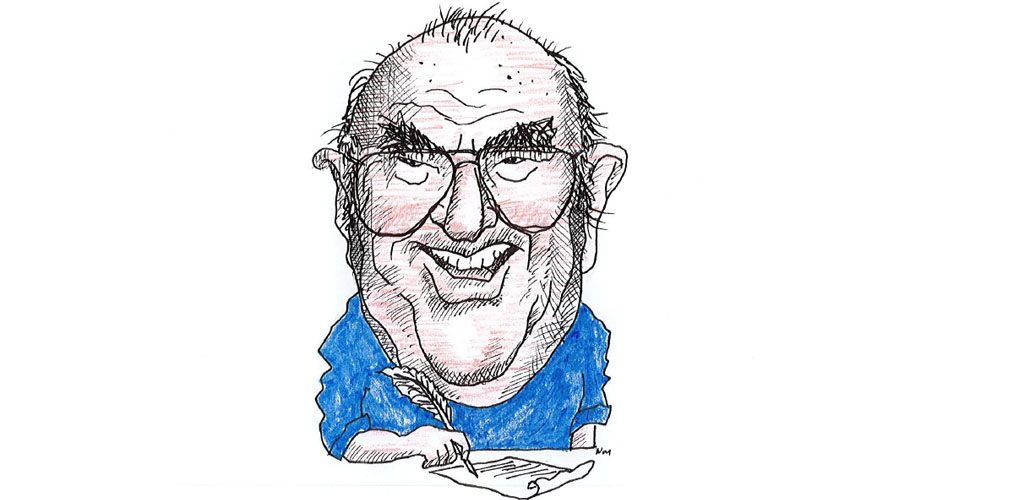Clive James, who died this week, is being celebrated for his humour and writing, and his genius was in his ability to mix high and low; indeed, in a very Australian egalitarian way, to discuss works on their merit rather than according to prejudices and hierarchies about what art should be, and to see interest and, yes, humour, wherever he looked.
I came to Clive James late, as his TV career was winding down. I became interested in his books of reviews, and hunted them out in dusty bookshops, getting my hands on as many as I could. There are demarcations in his writing between the poetry, the serious criticism and the journalism, but he could write about anything cultural, and in his writings tennis players, pop singers, actors and motor racing drivers rub shoulders with opera singers, painters and medieval poets. He could find humour in high art and could take popular TV seriously. Well, he wrote about the latter in furiously funny fashion, but it wasn’t beneath him, as it might have been for other Oxbridge graduates.
Of course, Japanese game shows and Dante are not the same, and James’ first love was poetry, for which he primarily wanted to be remembered (but for which he probably won’t). He was educated at a time when poetry had more prominence than it has now, when it was as popular as TV. But poetry is where the craft of writing most dazzles, and poetry or prose, James was a master stylist. The humour just made it seem all the more effortless.
As he got older, a lecturing tone crept in, as he took on the role of man of letters. He had strong opinions (including his rejection of religion, despite, we might note, his love of Dante). He had quite the ego, as noted by both himself and those around him. He once said that in show business you can’t be modest about your level of talent because there are too many people ready to agree with you. The ego wasn’t precluded by the fact that he could laugh at himself. It’s just that he found many things funny.
You can see evidence of both ego and self-deprecation in the book May Week was in June, a continuation of his memoirs. He describes his lack of focus, except for non-essential tasks, like writing poems about ducks who, somehow, have annoyed him, but he then muscled in on the role of poetry editor at Granta so he didn’t have to put up with editors not as talented as he was.
In a review of Philip Larkin’s jazz criticism, James noted Larkin’s rejection of the pretension of John Coltrane. Larkin thought that modern art went badly when it intellectualised or mystified. I think Larkin was something of an inspiration for James. Larkin was poet and critic, and he felt that art was for human beings to ‘enjoy’ and ‘endure’. I read the passage discussing this in one of James’ collections of reviews, which I grabbed randomly off the shelf and was flicking through after I heard he died. Often James wrote about the philosophy of art, if I can call it that, but without sacrificing lucidity, or humour and enjoyment, and because of this his frighteningly expansive intellect gets under the radar. And perhaps so it should. Truly great writers explain the complicated well and draw you in. Second-rate writers boost their egos by making things more complicated or by being unnecessarily negative.
James’s writing bubbles with enthusiasm. While he could be just as funny in his destruction of art he thought second-rate, he was one of those critics who wants to send you back to read or listen to the works he loves. There is a sunniness to his writing, a post-war optimism, thrown into more relief by the shadows of the wars and the loss of his father, and boosted by fond remembrance, possibly exaggerated by nostalgia, of his childhood in Sydney, where its harbour shone like, as he once put it, crushed diamonds. When he did fly home, he would sit at Circular Quay and enjoy white wine and the crushed diamonds, and when he no longer could fly home, it grew better in the memory. Sometimes his long-distance national pride was skewed – he praised John Howard’s prime ministership without perhaps understanding how the nation had shifted and how many non-white Australians felt alienated by Howard’s love of the good old days. But I think James owed some of his success to the unpretentious, easy-going Australia he grew up in.
Seeing him as a larrikin perhaps hides the fact that he was in love with language (and not just English – he taught himself multiple languages, partly by reading favourite books in their original languages), captured by, voracious for, writing and its potential. Even the TV criticism, while we might only dimly remember the characters he is discussing, astounds with its literary richness. James finished May Week was in June by cunningly combining the (false) modesty and ego in the sentence, ‘All I can do is turn a phrase until it catches the light’. Like crushed diamonds.
Nick Mattiske blogs on books at coburgreviewofbooks.wordpress.com













